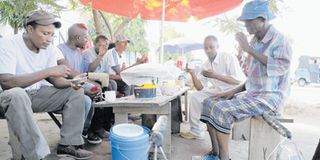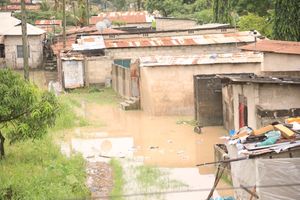Smell the coffee in kijiweni while you make your voice heard

What you need to know:
- Mr Mmaka Habibu, 55, the owner of the smoky makeshift café popularly known as Kijiwe cha Kahawa, pours some coffee in one of the tiny cups and hands it over to one of the coffee lovers who frequently visits the place every morning while jibing, “So Chadema’s current agenda is hunger?”
It is about quarter past seven in the evening when men aged between 38 and 60 dressed in tunics start gathering around an old wooden table. The table is surrounded with four wooden benches and on it, are three metal kettles full of coffee with glowing embers underneath and small-white cups plus a medium-sized basin of water.
Mr Mmaka Habibu, 55, the owner of the smoky makeshift café popularly known as Kijiwe cha Kahawa, pours some coffee in one of the tiny cups and hands it over to one of the coffee lovers who frequently visits the place every morning while jibing, “So Chadema’s current agenda is hunger?”
The other people in the makeshift cafe burst into roaring laughter and they suddenly start talking in turns, about the current issue between the government and the main opposition party, Chadema on whether the country faces food insecurity, which has been in the news for some time. Here, there is no moderator.
There are many places like this makeshift cafe across the country where people come together to discuss current affairs in the political, social, sports and economic sectors. They are areas in social life where individuals can come together to freely discuss and identify societal problems, and through these discussions influence political actions.
They are known as ‘’jobless corners’’ famous as vijiwe vya kahawa. Such groups are described as public spheres in the political science and sociology disciplines. Coffee sellers offer discursive spaces in which individuals and groups associate to discuss matters of mutual interest and, where possible, to reach some common judgment.
They can be seen as theaters in modern societies in which political participation is enacted through the medium of talk and a realm of social life in which public opinion can be formed.
And there are many places like this one across Tanzania. Among them is the Mr Habibu’s makeshift café located near the famous Kariakoo Mosque, Masjid Ladhully.
Mr Habibu says he does not take coffee selling as a serious business but rather a tradition that was passed to him by his late father. He says he makes Sh20, 000 each day, which translates into Sh600, 000 per month. He normally sells his coffee after morning and evening prayers.
“This is not just a trading place, but a part of our social system inherited from our ancestors as a socially built-in custom that, as a society member, you need to integrate with others to discuss mutual issues and come up with solutions,” narrates Mr Habibu while serving me a cup of hot coffee with no handle, the coffee is as black as soot and as bitter as gall. I pay Sh 100 for a cup.
In existence for 100 years
Mr Habibu who resides at Sikukuu/Twiga Street in Kariakoo says that he inherited the kijiwe from his father who inherited it from his grandfather.
“This place originally belongs to my grandpa,” a gray-haired old man, Habibu, told me while smiling. He has been running the kijiwe for almost three decades and is visibly proud of it.
He says that the kijiwe is more than a hundred years old adding that, “Even in the colonial era, people came here to discuss about the oppression and exploitation plus the independence struggle.”
Asked why he sells coffee and not anything else, Mr Habibu says; “It is more engaging, some people consider coffee drinking their basic life routine that sometimes they think they cannot do without.” He was however quick to point out that it is not as addictive as alcohol.
On why people like gathering in these makeshift cafes, Mr Katabi Komba, 44, one of the regulars there explains that it is more than the coffee.
“We don’t just come here for coffee, but also for interaction with our fellow citizens as this gives a sense of unity and long history of solidarity we have as Tanzanians,” he says.
He points out that people who feel marginalised and voiceless go to such places to express their grievances to the authorities.
Mr Mwinjuma Haji, 30, one of the permanent and loyal kijiwe attendants at Tabata-Relini says, “kijiwe remains the only option people have to make their grievances heard especially if they don’t have access to the authorities or media outlets.”
While acknowledging that people don’t attend the kijiwe just for coffee, Mr Said Chuvira Mnyalu, another coffee seller based in Kariakoo says that “the quality and good taste of the coffee matters as well,” as there are many vijiwe vya kahawa and if you don’t brew some good coffee, you lose patrons.
The best coffee
When asked about how to make the best coffee, Mnyalu said that the key is the quality of coffee beans. “If you don’t have good quality coffee beans then it will not taste as ‘sweet’ as your competitor’s.
Mnyalu says that he attracts many attendants at his kijiwe since, unlike others; he does not manipulate his customers by putting a lot of water than coffee powder. He says, “People would like to drink real coffee and not a sample of it,” said the father of one.
Speaking about the influential nature of vijiwe, Mr Kulwa James, 40, one of the zealous kijiwe attendants at Arusha Street, Ilala cites campaign season as an example.
“During campaigns, not a single political leader can miss kijiwe session, because it is influential. It comprises of people of different status. Legislators and other local council leaders come to meet the people here, those who don’t visit vijiwe don’t get votes,” he says.
Other coffee sellers have however turned these makeshift cafes as serious business platforms working overtime and even around the clock.
Most coffee sellers located in Kariakoo for example are vendors and those who have the vijiwe usually sell in the morning and evening. Most of those who sell on part time basis are located at the Mosques and they often operate after the Morning Prayers and then close only to be reopen during the Evening Prayers.
When asked why that has been the practice, Mr Habibu says that there is a scientific explanation as to why most people take coffee in the morning and evening.
Mr Abdallah Mchau, 60 however thinks that another reason could be because most families are home in the morning, leave for work then return later in the evening.
“In the afternoon the residents will be at work. The reason why most of these coffee corners start operating in the morning and evening is based on the assumption that families are home and could come to such places to discuss their mutual issues,” he says.
But for Calvin N’komoe who works on full time basis selling coffee around Kariakoo and its suburbs, it is all about targeting the right customers. N’komoe, who makes almost Sh40, 000 daily from selling coffee says he works for 18 hours.
“I think it depends on your target customers,” says the father of one who looks visibly tired.
“My customers are not the residents, but the shopkeepers, technicians here, drivers and conductors. They are available every time and they need my services and I make money,” he explains.
N’komoe says that he normally wakes up at 4.00 a.m. in the morning to start preparing coffee assisted by his wife, Josephine. He then starts selling coffee from five in the morning to eleven in the morning when he finishes the first stock.
He then goes back home to start preparing another stock to be sold from 2.00pm in the afternoon, which he finishes at seven. N’komoe says the last stock is what he sells from eight in the evening to eleven when his day ends.
However, these vijiwe have been criticised as breeding grounds of idlers who do not want to go to work leading to crimes and poverty in the country.
But many attendants of these vijiwe have rubbished these allegations. Mr Elias George for example asks, “Who has ever proved that the people are jobless?” He even doubts the name ‘jobless corners.’
According to Mr George, once people have completed their work especially the manual labourers, they go to patronise such places as part of their social life.
To have easy, smooth and untiring discussions, Mr George says, “Coffee sellers act as catalysts in the process.”
Email: [email protected]




